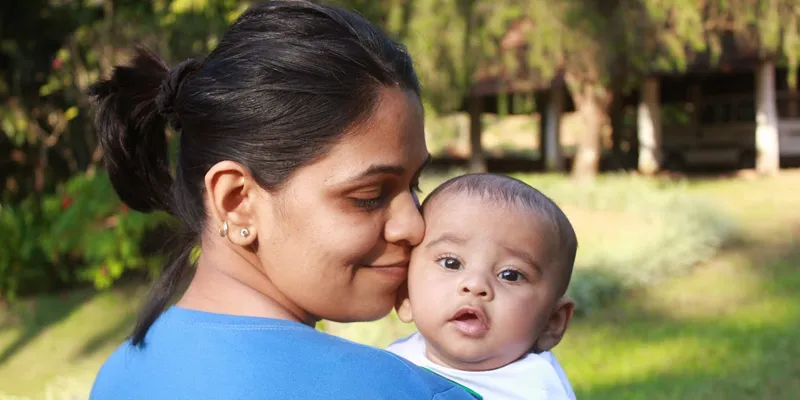Mother knows best: Happibo makes healthy food children actually want to eat
Her ‘aha moment’ came while dining out with her husband one evening. While the couple savoured the meal, their toddler was busy pushing around the pulp on his plate. “It struck me then — why does this little guy need to eat boring food?” recalls Harshada Joshi, Founder of Happibo, a weaning-food venture that makes ready-to-feed meals and snacks for babies in the age group of six months to two years.

Harshada claims that motherhood is by far the best thing that has happened to her. “I became a mother in 2013 and until 2014, I had not even the remotest clue that one day I would be running my own startup. I never tried to be an entrepreneur but a child gives you perspective.” In August 2015 they set up the company and after much hard work and research, Happibo (derived from happy and baby) launched its products on September 12, 2016.
A mother’s challenge
From August 2014 onwards, the 35-year-old started working on her idea. The priority was to find a reliable tech or food scientist since she herself wasn't from the industry. “I was looking for someone who not only had the right background but was also a parent,” she says.
She came across Satya Pulakurthi and his wife, Bhagavathi, both 42-year-old food technologists who had their own consulting firms. Once they started discussing the kind of products they wanted to develop, both Satya and Bhagavati got excited about it. “They themselves being parents saw it as a way of using their knowledge for a worthy cause. And given this strong connect, we agreed to work as co-founders,” she says.
Bhagavathi holds a degree from IIT Kharagpur and Satya from Lincoln University, UK. They collectively have over 20 years of experience in the food industry and have worked with several companies around the world.
Marching past challenges
The initial four months were spent on identifying the need and reaching out to mothers to understand their challenges.
During their research, they discovered that 50 percent of kids in the range of one to three, across socioeconomic segments, have nutritional gaps.
“Parents have definitely become very conscious and for the right reasons. I mean, if the Maggi fiasco has taught us anything, then it is clearly that it’s very hard to know whom to trust — is it the food brands or the approving authorities? It will take us time to win the trust of parents and all our efforts are geared towards it. For example, we declare all our ingredients. If you look at our packaging, it is not completely wrapped around, as we want parents to be able to see before they buy. We add zero sugar or salt,” she says.
The next 18 months were spent on product development but most of the tips she received from baby food companies abroad had no relevance in India because food production here depends largely on additives for increased shelf life.
“We went from one food science institute to other but nothing came through.” Although instances like these made them contemplate quitting, they eventually found a big R&D consulting group based out of the UK. “The lead scientist had spent over 50 years in the food industry and with him on board, we really started moving forward. After hundreds of trials and iterations on product development, the final product was ready,” she shares.
A scaled-up kitchen
Based in Bengaluru's Jigani Industrial Area, Harshada’s manufacturing unit is actually more of a scaled-up kitchen consisting of a peeling table, a dicing table, and large utensils. All of this is strictly controlled, with only selected people allowed inside the facility. This control extends to ingredients and packaging, too. To ensure quality and gain mothers’ trust, there is no outsourcing — it is Harshada and Satya who create the products along with the daily staff at the factory.
Harshada is in charge of recipes and retailing while Satya handles technology and process development. Bhagavathi identifies the right farms and handles ingredient selection. They also have a scientific advisory panel featuring a nutritionist and a pediatrician.

“Coming from the pharmaceutical industry and having worked in a production facility early in my career, I understand manufacturing process guidelines very well. Satya is a well-known quality and production auditor who audits facilities around the world. He has also worked with some of the biggest food multinationals and thus his standard of how a manufacturing unit should operate is very high,” Harshada says.
If all goes well, they should have a state-of-the-art facility by the second half of 2017.
Two-pronged approach
Happibo’s aim is two-pronged — to make mothers happy by providing interesting yet healthy food and to use the first-mover advantage, especially in the wet food segment, to set the bar high for other entrants.
To meet the first, says Harshada, “We have introduced a wide variety of fruits and veggies for babies to develop healthier eating habits. Clean and nutritious food is at the core of all our product development efforts.”
Working with exotic as well as Indian vegetables, they also include one superfood (chia seeds, for example) in each of their products. Children can have meals like mango and sweet potato puree with cashew nuts and spinach and pumpkin soup with black raisins.
The ingredients are sourced from greenhouse farms and are additive-free. The packaging material, Harshada shares, is US FDA-approved.
Zero expenditure on marketing
The products are available on FirstCry and a few stores in Bengaluru. Mothers in Bengaluru have also been ordering online from the Happibo website.
Harshada says she has been humbled by the response she has received from mothers.
“I go personally to deliver the products for any online orders, and I am in shops on weekends, talking to moms. Our retail partners are helping us with feedback,” she says, adding that they will begin pan-India deliveries once they are sure the product will be accepted.
They have spent zero on marketing and are still able to meet targets.
“We are also working on some key partnerships to expand across India. This should take shape in the first quarter of 2017.”
First-mover advantage
Globally the baby food industry consists of two segments — dry, powdered food and wet, natural food. The latter, according to Harshada, helps develop the appetite for fruits and veggies as it offers real taste and texture.
“India has a number of powdered food companies but we are the first one in the wet, natural food segment,” says Harshada. While they look forward to competition, they want to set the bar high when it comes to quality.
“We are already doing things in ways that no large multinational would embrace easily. For example, companies like Nestle offer shelf life of two years. Ours is only three months because we believe the quality and nutrition profile is far better for a three-month shelf life than for a two-year shelf life.”
In the context of the global market and developed countries, powdered food is a minority segment and wet, natural food dominates, as it is real food. The market is mostly split between multinationals and companies led by parents who want the very best for children and are going the non-industrial way. Happy Family from the US, Hipp in Germany, Plum Organic in the UK, and Bumbles in South Africa are parent-led companies.
The power of a mother backing an entrepreneurial vision for babies to eat well and stay happy should resonate with parents. All parents want the best for their kids, and if Harshada continues to keep a sharp eye on the feedback from mothers, both the sailing and scaling can be smooth.







